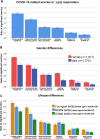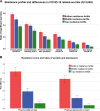Resilience, COVID-19-related stress, anxiety and depression during the pandemic in a large population enriched for healthcare providers
- PMID: 32820171
- PMCID: PMC7439246
- DOI: 10.1038/s41398-020-00982-4
Resilience, COVID-19-related stress, anxiety and depression during the pandemic in a large population enriched for healthcare providers
Abstract
COVID-19 pandemic is a global calamity posing an unprecedented opportunity to study resilience. We developed a brief resilience survey probing self-reliance, emotion-regulation, interpersonal-relationship patterns and neighborhood-environment, and applied it online during the acute COVID-19 outbreak (April 6-15, 2020), on a crowdsourcing research website ( www.covid19resilience.org ) advertised through social media. We evaluated level of stress (worries) regarding COVID-19: (1) contracting, (2) dying from, (3) currently having, (4) family member contracting, (5) unknowingly infecting others with (6) experiencing significant financial burden following. Anxiety (GAD7) and depression (PHQ2) were measured. Totally, 3042 participants (n = 1964 females, age range 18-79, mean age = 39) completed the resilience and COVID-19-related stress survey and 1350 of them (mean age = 41, SD = 13; n = 997 females) completed GAD7 and PHQ2. Participants significantly endorsed more distress about family contracting COVID-19 (48.5%) and unknowingly infecting others (36%), than getting COVID-19 themselves (19.9%), p < 0.0005 covarying for demographics and proxy COVID-19 exposures like getting tested and knowing infected individuals. Patterns of COVID-19 related worries, rates of anxiety (GAD7 > 10, 22.2%) and depression (PHQ2 > 2, 16.1%) did not differ between healthcare providers and non-healthcare providers. Higher resilience scores were associated with lower COVID-19 related worries (main effect F1,3054 = 134.9; p < 0.00001, covarying for confounders). Increase in 1 SD on resilience score was associated with reduced rate of anxiety (65%) and depression (69%), across healthcare and non-healthcare professionals. Findings provide empirical evidence on mental health associated with COVID-19 outbreak in a large convenience sample, setting a stage for longitudinal studies evaluating mental health trajectories following COVID-19 pandemic.
Conflict of interest statement
The authors declare that they have no conflict of interest.
Figures



References
-
- Fontanarosa P. B., Bauchner H. COVID-19-Looking beyond tomorrow for health care and society. J. Am. Med. Assoc. 10.1001/jama.2020.6582 (2020). - PubMed
-
- Walensky R. P., Del Rio C. From mitigation to containment of the COVID-19 pandemic: putting the SARS-CoV-2 genie back in the bottle. J. Am. Med. Assoc. 10.1001/jama.2020.6572 (2020). - PubMed
Publication types
MeSH terms
Grants and funding
- R01 MH117014/MH/NIMH NIH HHS/United States
- K23 MH120437/MH/NIMH NIH HHS/United States
- R01-MH117014/U.S. Department of Health & Human Services | NIH | National Institute of Mental Health (NIMH)/International
- R01-MH119219/U.S. Department of Health & Human Services | NIH | National Institute of Mental Health (NIMH)/International
- K23-MH120437/U.S. Department of Health & Human Services | NIH | National Institute of Mental Health (NIMH)/International
LinkOut - more resources
Full Text Sources
Medical
Miscellaneous

